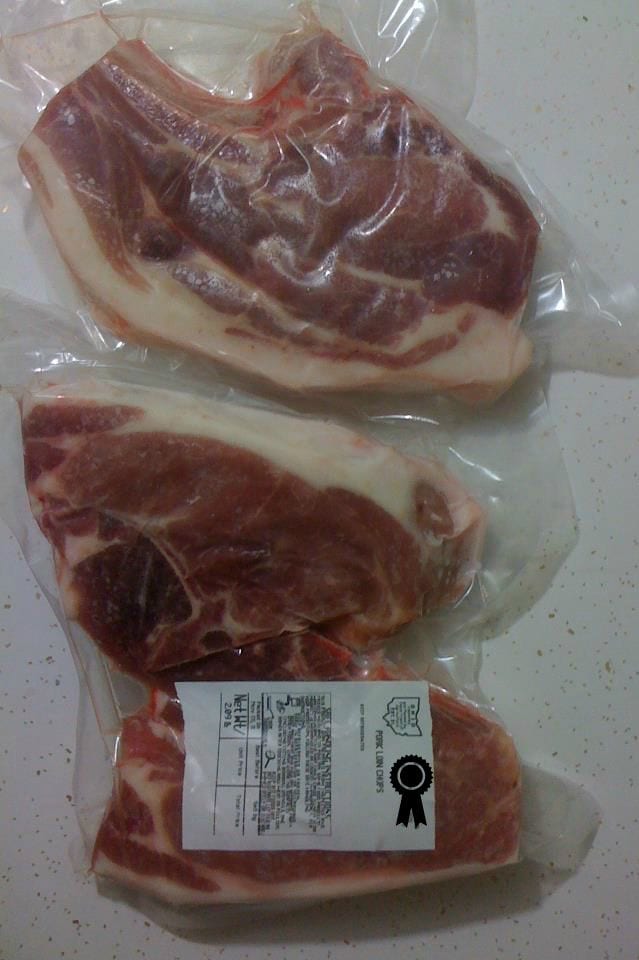 Passage of the PRIME Act [H.R. 3187] would give states the power to legalize the sale of custom processed meat in intrastate commerce (i.e., meat from an animal slaughtered and processed at a facility where an inspector is not required to be present to observe the slaughtering and conduct an ante mortem and post mortem inspection of the animal).
Passage of the PRIME Act [H.R. 3187] would give states the power to legalize the sale of custom processed meat in intrastate commerce (i.e., meat from an animal slaughtered and processed at a facility where an inspector is not required to be present to observe the slaughtering and conduct an ante mortem and post mortem inspection of the animal).
Currently, federal law prohibits the sale of custom processed meat; the prohibition went into effect with the passage of the Wholesome Meat Act of 1967. The Act mandated that meat could not be sold unless it was slaughtered and processed at a facility that was either federally inspected or one inspected in a state whose meat inspection laws were at least as strict as the federal requirements; meat slaughtered and processed at a state facility could only be sold within the state.
The Wholesome Meat Act has done tremendous damage to local slaughterhouse infrastructure around the country. In 1967 there were nearly 10,000 slaughterhouses in the countryA; today there are less than 3,000.B*
The bottleneck caused by the lack of slaughterhouses has frustrated small livestock operations in getting their products to market and has led to an inability to meet the overall demand for locally produced meat. The 1967 Act has been one of the worst laws ever passed for local food; what’s more, it was known from the beginning that the Act would have the effect it did.
On September 16, 1971, the Small Business Administration (SBA) presented a paper to the United States Senate Select Committee on Small Business titled: “The Effects of the Wholesome Meat Act of 1967 upon Small Business – A Study of One Industry’s Economic Problems Resulting from Environmental-Consumer Legislation Prepared by the Small Business Administration.”C
The SBA paperC discusses the cost of compliance (mainly, the costs of facility upgrades) with the requirements of the Act and the effects it could have on small-scale slaughterhouses and processing plants. The paper includes the following comments:
- [I]t could be argued that the Wholesome Meat Act was as much of a disaster for many small meat firms as a hurricane….[p. 32]
- During the Congressional deliberations in 1967, over the Wholesome Meat Act, there was little discussion of the effects of the Wholesome Meat Act upon those 15,000 or so firms who now would be subject to rigorous inspection of their product. [p.31]
- Emphasis was upon “consumerism,” the American housewife and her family. And this was “consumerism” in a rather narrow sense. There was little or no consideration given to the costs, particularly in the first few years, that would have to be borne by the meat industries in order to comply with the Wholesome Meat Act. …[I]t was likely that meat prices would increase for several years, because of the Act. Scant attention was paid to this highly important problem during the Congressional consideration of the Wholesome Meat Act. [p. 31]
- Nor was much attention paid to the potential effects of the new law upon competition of in the meat industries.… [T]he meat industries are among the more competitive in the American economy. But the Wholesome Meat Act could lead to a significant diminution of competition. How many firms would have to shut down because they could no longer compete due to the new law? … Would the Wholesome Act lead, however unwittingly, to an undesirable increase in concentration in the meat industries? Questions such as these, highly fundamental questions, were barely raised during the legislative process. [p. 31]
- The SBA report notes that following passage of the Wholesome Meat Act, legislation was introduced in Congress that would have allowed SBA disaster loans for slaughterhouses attempting to become compliant with the Act if the slaughterhouses financial need could not be met “by private financial institutions or by regular Government credit programs.” As recorded in the report, “the SBA disaster fund ‘is based upon the legal principle that the emergency is created by the act of the sovereign U.S. Government which is beyond the control of the individual business. This may cause major losses to the businessman, particularly if the company is forced out of business. The sovereign act is thus similar to a natural disaster…’” [p.33]
- We find that the small business concerns affected by the Act need a substantial amount of financial assistance in effecting compliance with the Wholesome Meat Act. The establishments not in conformance with the Wholesome Meat Act say they need $278.6 million to make the improvements needed to conform to the law. Of this amount, the establishments surveyed say…$132.2 million is unavailable. In addition, fully one-third of the establishments not in conformance with the Act report that financing is unavailable…. We find that the amount that may be forthcoming from private financial institutions is seriously deficient. [p.84]
- The Wholesome Meat Act only directly affects strictly intrastate producers whose production at the most is 20-25 percent of the total national products of meat. Of this intrastate group, slightly less than half are not in conformance with the Wholesome Meat Act and probably about one-third or so of the group not in conformance will go out of business if some form of Federal loan program is not developed for their benefit. [p. 86]
- The authors think the empirical evidence contained in this report points inevitably to the conclusion that many firms will suffer substantial economic injury without Federal assistance. In fact, many face terminal economic injury without some form of Government relief. [p.87]
Much of what the SBA report questioned about the Wholesome Meat Act has come to pass. The Act did contribute significantly to the consolidation of the meat industry; today four companies control over 80% of beef processing in the U.S. and four companies control over 60% of pork processing.D
The inability to comply with costly federal requirements has led to thousands of slaughter and processing facilities going out of business; many of these were small facilities processing only for commerce within the state. These facilities might have been accountable for only 20-25 percent of national meat products but they gave the small livestock farmer much better access to slaughterhouses at a better price than is the case today. The local abattoirs that dotted the country are mostly gone. Passage of the PRIME Act can begin the process of bringing them back.
The Wholesome Meat Act has not led to the production of safer meat today; there are more recalls than ever for positive pathogen tests in meat products. The 1967 Act has also contributed to higher meat prices as the writers of the SBA report predicted; the higher costs with expanded federal regulation have been passed on to the consumer. The Wholesome Meat Act has failed small-scale slaughterhouses, family farms, consumers and communities on numerous levels.
It’s time to start the process of rolling it back by passing the PRIME Act. Call you representative and ask that they sign on as a cosponsor of HR 3187.
For inquiries, call 703-208-3276 or email [email protected] [Print PDF – http://bit.ly/PRIME-ACT]
———-
REFERENCES
A Denny, R.C.H. (2012). Between the Farm and the Farmer’s Market: Slaughterhouses, Regulations, and Alternative Food Networks (Master’s thesis). Retrieved from Auburn University AUETD database, https://etd.auburn.edu/handle/10415/3247*
B United States Department of Agriculture, National Agricultural Statistics Service. Livestock Slaughter 2014 Summary. April 2015. p. 62. Posted at http://www.usda.gov/nass/PUBS/TODAYRPT/lsan0415.pdf [View PDF – http://bit.ly/1i6sxS9]
C United States. Small Business Administration, and United States. Congress. Senate. Committee on Small Business. The Effects of the Wholesome Meat Act of 1967 Upon Small Business: A Study of One Industry’s Economic Problems Resulting from Environmental-Consumer Legislation. Washington: U.S. Govt. Print. Off., 1971.
D Heffernan, W. & Hendrickson, M. (2007). Concentration of agricultural markets. University of Missouri, Department of Rural Sociology. Posted online at http://www.foodcircles.missouri.edu/07contable.pdf [View PDF – http://bit.ly/1JZuqGf]
*Editor’s Note (2/26/16): Replaced the statement based on more specific data; the previous 14,000 figure included non-slaughtering facilities (e.g., cut-and-wrap shops). Revised the reference listing and added current “A” source.
YOUR FUND AT WORK
 Services provided by FTCLDF go beyond providing legal representation for members in court cases. The Fund is not an insurance company and cannot guarantee representation on all legal matters; possible representation is just one of the benefits of membership.
Services provided by FTCLDF go beyond providing legal representation for members in court cases. The Fund is not an insurance company and cannot guarantee representation on all legal matters; possible representation is just one of the benefits of membership.
Educational and Political Action Services also provide an avenue for FTCLDF to build grassroots activism to create the most favorable regulatory climate possible. In addition to advising on bill language, FTCLDF supports favorable legislation via action alerts, social media outreach, and the online petition service.
You can help FTCLDF by becoming a member or donating today.

 Anyone wanting to make a contribution to support the work of FTCLDF can make a donation online or send a check to:
Anyone wanting to make a contribution to support the work of FTCLDF can make a donation online or send a check to:
FTCLDF
8116 Arlington Blvd, # 263
Falls Church, VA 22042
Prefer to make a tax-deductible donation? Contact us by email at [email protected] or call 703-208-FARM (3276). Thanks for your support.